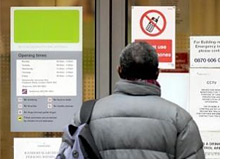Youth Unemployment Rate of 19.5% Is Highest on Record
 The Bureau of Labour Statistics is reporting that the youth unemployment rate in Canada was 19.5% for the month of January, which is the highest ever rate on record.
The Bureau of Labour Statistics is reporting that the youth unemployment rate in Canada was 19.5% for the month of January, which is the highest ever rate on record.The youth unemployment rate includes people aged 16-24, and was first tracked in 1948.
Based on the numbers released by the Bureau of Labour Statistics, many young people will not be able to afford to attend school this coming year. The number of young people employed in the month of January was just 51.4%, which is the lowest January rate on record. January is traditionally the peak month for youth unemployment, due to the fact that many youths have been off from school for 3 or 4 months. And a lot of companies lay off after Christmas.
The January 2011 unemployment rate for young men was 20.7%, while the unemployment rate for young women was 18.3%.
The youth unemployment rate in Canada has spiked dramatically since 2008, due to the disintegration of the overall job market. The youth unemployment rate was 10.8% in January of 2008, meaning that we have witnessed a near 9% increase over just two years.
How does our current January youth unemployment rate compare to rates posted during previous recessions?
In 1982, when the Canada was battling high unemployment rates and inflation, the January youth unemployment rate was 17.3%.
In 1992, when Canada was dealing with a major slowdown in the economy, the January youth unemployment rate was 14.5%.
The last time that the youth unemployment rate was below 10% was 2000, which was at the height of the dot-com boom.
The lowest youth unemployment rate on record for the month of January 5.7%, which was posted in January of 1953. That number seems almost ridiculously low given our current economic troubles.
The industry that employed the highest number of youths in January of 2011 was Leisure & Hospitality, followed closely by Retail Trade. Leisure & Hospitality includes food services, which would include all of the people working at places like McDonald's, Starbucks and Burger King.
It's certainly not surprising that the youth unemployment rate is spiking. Many companies have had to cut back due to the "Great Recession", which means that many young people have been unable to find jobs. There are few industries that are thriving right now, and even fewer that can accommodate millions of unemployed youth workers.
High youth unemployment results in a greater need for student loans, an increased burden on the average Canadian household and less youths being able to afford post-secondary education. All three of these issues have a dramatic impact on the overall health of the nation over the long-term.
Given the current state of the economy, the prospects for a major dip in the youth unemployment rate over the next couple of years seems pretty slim. I suspect that the overall unemployment rate will remain fairly high in Canada for the foreseeable future, which doesn't help the job prospects of those between the ages of 16-24 going forward.


Minimum Wage
ReplyDeleteMinimum Wage logoSign the petition to win a raise for B.C.’s lowest paid workers!
The $10 NOW campaign
B.C.’s lowest paid workers deserve a raise. Minimum wage earners working full-time should earn enough to stay above the poverty line. That can only be achieved by immediately raising the minimum wage to at least $10.00 per hour.
The B.C. Federation of Labour in cooperation with other groups is spearheading a campaign to raise BC's minimum wage. Our goal is to win a wage increase for the 63,000 British Columbians who earn $8 per hour along with another 293,000 people who earn less than $10. And we want to scrap the so-called $6 training wage.
The provincial government likes to crow about a booming economy—but it’s only booming for a few.
B.C.’s lowest paid workers have been left behind by the Campbell government because our minimum wage has been frozen since 2001. And the number of minimum wage jobs in B.C. has actually increased since 2001 when the Liberals were first elected—a sure sign that economic prosperity isn’t being shared in our province. Download a copy of the minimum wage fast facts.
Our Solution
To ensure that no worker in B.C. lives below the poverty line, the B.C. Federation of Labour is calling for a three-step increase in the minimum wage:
* An immediate increase to $10 combined with the elimination of the $6 training wage;
* A subsequent increase to $11 per hour one year later; and
* An indexing formula, so that like our provincial politicians, those earning the minimum can be assured of an annual increase in pay.
Broad support
Our polling shows that nearly 80 per cent of British Columbians support an increase to $10 NOW. And we’re reaching out to win the backing of community leaders as well. Many municipal councils and politicians are echoing our call for an immediate pay boost for B.C.’s lowest paid workers.
Lowest of the Low
The Minimum Wage in British Columbia has not increased for eight years and is now the lowest in Canada: